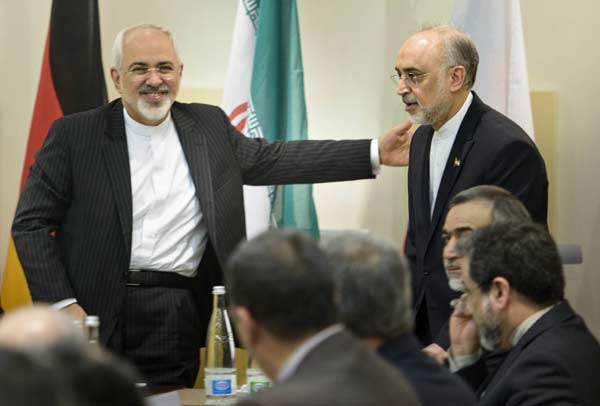Iran talks heading for new phase
|
Iranian Foreign Minister Mohammad Javad Zarif (left) greets the head of the Iranian Atomic Energy Organization, Ali Akbar Salehi, as he arrives for a meeting with officials on Tuesday in Lausanne, Switzerland. Brendan Smialowski / Pool Photo Via AFP |
Wrapping up six days of marathon nuclear talks with mixed results, Iran and six world powers prepared on Tuesday to issue a general statement agreeing to continue negotiations in a new phase aimed at reaching a comprehensive accord by the end of June, officials said.
The joint statement is to be accompanied by additional documents that outline more detailed understandings, allowing the sides to claim enough progress has been made thus far to merit a new round, the officials said.
The talks have already been extended twice as part of more than a decade of diplomatic attempts to curb Teheran's nuclear advance, and the next stage will be presented as a new phase because most of the parties had ruled out another prolongation of this round.
One of the officials said the statement was general in part because differences between the sides remained ahead of a new phase of negotiations toward a comprehensive deal by late June. The second official said other documents will be more technical in nature and will also be made public later in the day.
Both spoke on the grounds of anonymity because they are not authorized to comment.
US officials earlier had said the sides were aiming for a framework agreement by the end of March but then revised the language, speaking of an "understanding", due in part to opposition to a two-stage agreement from Iran's supreme leader, Ayatollah Ali Khamenei, who earlier this year demanded one deal that nails down specifics.
The documents were being finalized among the six countries negotiating with Iran, and the Iranian side had not yet signed off on them, said the first official.
Russian Foreign Minister Sergey Lavrov, who left Lausanne on Monday saying he would return if a deal was imminent, was heading back to the Swiss city, indicating that an end to the talks was near.
In Moscow, he told reporters: "Prospects for this round of negotiations were not bad, and I would even say good."
Foreign Ministers of five nations at the table already joined US Secretary of State John Kerry and Iranian Foreign Minister Mohammad Javad Zarif at the talks over the weekend in an intense effort to reach a political understanding on terms that would curb Iran's nuclear activities in exchange for sanctions relief.
Kerry and others at the table said the sides have made some progress, with Iran considering demands for further cuts to its uranium enrichment program but pushing back on how long it must limit technology it could use to make atomic weapons. In addition to sticking points on research and development, differences remain on the timing and scope of sanctions removal, the officials said.
Officials in Lausanne said the sides were advancing on limits to aspects of Iran's program to enrich uranium, which can be used to make the core of a nuclear warhead.



















